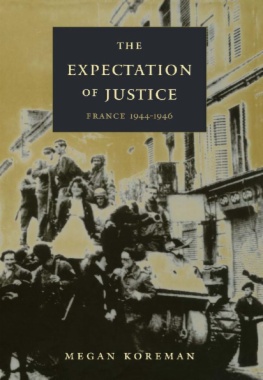In The Expectation of Justice Megan Koreman traces the experiences of three small French towns during the troubled months of the Provisional Government following the Liberation in 1944. Her descriptions of the towns’ different wartime and postwar experiences contribute to a fresh depiction of mid-century France and illustrate the failure of the postwar government to adequately serve the interests of justice.
As the first social history of the “après -Libération” period from the perspective of ordinary people, Koreman’s study reveals how citizens of these towns expected legal, social, and honorary justice—such as punishment for collaborators, fair food distribution, and formal commemoration of patriots, both living and dead. Although the French expected the Resistance’s Provisional Government to act according to local understandings of justice, its policies often violated local sensibilities by instead pursuing national considerations. Koreman assesses both the citizens’ eventual disillusionment and the social costs of the “Resistencialist myth” propagated by the de Gaulle government in an effort to hold together the fragmented postwar nation. She also suggests that the local demands for justice created by World War II were stifled by the Cold War, since many people in France feared that open opposition to the government would lead to a Communist takeover. This pattern of nationally instituted denial and suppression made it difficult for citizens to deal effectively with memories of wartime suffering and collaborationist betrayal. Now, with the end of the Cold War, says Koreman, memories of postwar injustices are resurfacing, and there is renewed interest in witnessing just and deserved closure.
This social history of memory and reconstruction will engage those interested in history, war and peace issues, contemporary Europe, and the twentieth century.
- Contents
- Maps
- Acknowledgments
- List of Abbreviations
- Introduction
- Chapter 1. Three Towns, Three Liberations
- Chapter 2. Living in the Aftermath of a War
- Chapter 3. Legal Justice and the Purge of Collaborators
- Chapter 4. Social Justice and the Provisioning Crisis
- Chapter 5. Honorary Justice and the Construction of Memory
- Chapter 6. Popular Justice or Republican Legitimacy?
- Conclusion
- Notes
- Bibliography
- Index

